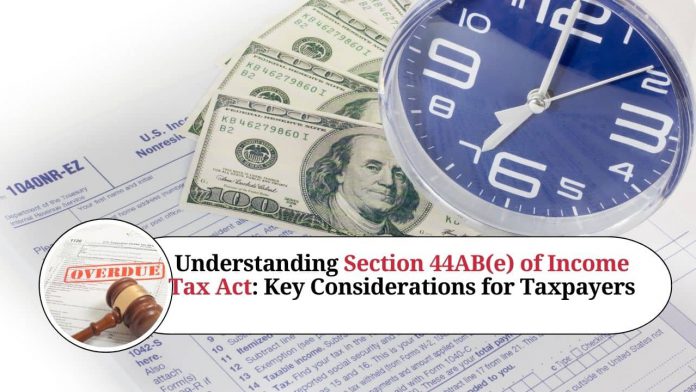As a taxpayer in India, it is important to be aware of the various provisions of the Income Tax Act, including Section 44AB(e), which deals with the tax audit requirements for certain businesses. This provision is particularly relevant for businesses that have significant cash transactions, and failure to comply with its provisions can result in penalties and legal consequences. In this article, we will explore the key considerations related to Section 44AB(e) and how it impacts taxpayers.
Overview of Section 44AB(e):
Section 44AB(e) of the Income Tax Act mandates tax audits for businesses that have cash receipts of Rs. 1 crore or more during the financial year. Specifically, this provision applies to businesses that receive cash payments over Rs. 10,000 for any single transaction or aggregate transactions in a day. This provision applies to all types of businesses, including sole proprietorships, partnerships, and companies.
Key Considerations for Taxpayers:
If your business falls under the purview of Section 44AB(e), there are several key considerations to keep in mind. These include:
- Appointment of a Chartered Accountant: As per the provisions of Section 44AB(e), businesses are required to appoint a chartered accountant to conduct the tax audit. The chartered accountant must be registered with the Institute of Chartered Accountants of India (ICAI) and must have a valid certificate of practice.
- Timelines for Tax Audit: The tax audit must be conducted within the specified timelines, which are generally the due date for filing the tax return. For example, for businesses that are required to file their tax return by 30th September, the tax audit must be completed by 30th September.
- Documentation and Records: Businesses that fall under the purview of Section 44AB(e) must maintain proper documentation and records of their cash transactions. This includes maintaining a cash book, bank statements, and other relevant documents. These records must be maintained for at least 6 years from the end of the financial year in which the transaction took place.
- Penalties for Non-Compliance: Failure to comply with the provisions of Section 44AB(e) can result in penalties and legal consequences. The penalty for non-compliance is 0.5% of the total turnover or gross receipts, subject to a maximum of Rs. 1,50,000. In addition to penalties, non-compliance can also lead to legal consequences, including prosecution and imprisonment.
Read Other Useful Blogs:
Conclusion:
Section 44AB(e) of the Income Tax Act is an important provision that impacts businesses that have significant cash transactions. Taxpayers who fall under the purview of this provision must be aware of the key considerations and requirements related to a tax audit, documentation, and penalties for non-compliance. By staying informed and compliant, taxpayers can avoid legal consequences and ensure smooth operations for their businesses.
Frequently Asked Questions:
Q1. What is Section 44AB(e) of the Income Tax Act?
Section 44AB(e) of the Income Tax Act mandates tax audit for businesses that have cash receipts of Rs. 1 crore or more during the financial year, specifically for businesses that receive cash payments in excess of Rs. 10,000 for any single transaction or aggregate transactions in a day.
Q2. Which businesses are covered under Section 44AB(e)?
This provision is applicable to all types of businesses, including sole proprietorships, partnerships, and companies.
Q3. Who can conduct the tax audit under Section 44AB(e)?
The tax audit must be conducted by a chartered accountant who is registered with the Institute of Chartered Accountants of India (ICAI) and must have a valid certificate of practice.
Q4. What are the timelines for tax audit under Section 44AB(e)?
The tax audit must be conducted within the specified timelines, which are generally the due date for filing the tax return. For example, for businesses that are required to file their tax return by 30th September, the tax audit must be completed by 30th September.
Q5. What kind of documentation and records are required under Section 44AB(e)?
Businesses that fall under the purview of Section 44AB(e) must maintain proper documentation and records of their cash transactions, including maintaining a cash book, bank statements, and other relevant documents.
Q6. What are the penalties for non-compliance with Section 44AB(e)?
The penalty for non-compliance is 0.5% of the total turnover or gross receipts, subject to a maximum of Rs. 1,50,000. In addition to penalties, non-compliance can also lead to legal consequences, including prosecution and imprisonment.
Q7. Is it mandatory to get a tax audit done under Section 44AB(e)?
Yes, it is mandatory for businesses that fall under the purview of Section 44AB(e) to get a tax audit done. Failure to comply with the provisions of Section 44AB(e) can result in penalties and legal consequences.
Q8. How long should the records of cash transactions be maintained under Section 44AB(e)?
The records of cash transactions must be maintained for at least 6 years from the end of the financial year in which the transaction took place.




















